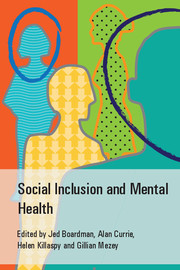Book contents
- Frontmatter
- Contents
- List of contributors
- List of tables, boxes and figures
- Foreword
- Preface
- Acknowledgements
- Scoping Group on Social Inclusion, Royal College of Psychiatrists
- Part 1 What is social exclusion?
- Part 2 Social exclusion: the scope of the problem
- 7 The extent of disadvantage, poverty and social exclusion in the UK
- 8 How are people with mental health problems excluded?
- 9 Social exclusion in specific social groups and individuals with mental health problems
- 10 Social exclusion and people with mental health problems: developing a clearer picture
- 11 Finding acceptance: the experiences of people who use mental health services
- 12 Social inclusion from the carer's perspective
- Part 3 Working towards inclusive psychiatry
- Index
11 - Finding acceptance: the experiences of people who use mental health services
from Part 2 - Social exclusion: the scope of the problem
Published online by Cambridge University Press: 01 January 2018
- Frontmatter
- Contents
- List of contributors
- List of tables, boxes and figures
- Foreword
- Preface
- Acknowledgements
- Scoping Group on Social Inclusion, Royal College of Psychiatrists
- Part 1 What is social exclusion?
- Part 2 Social exclusion: the scope of the problem
- 7 The extent of disadvantage, poverty and social exclusion in the UK
- 8 How are people with mental health problems excluded?
- 9 Social exclusion in specific social groups and individuals with mental health problems
- 10 Social exclusion and people with mental health problems: developing a clearer picture
- 11 Finding acceptance: the experiences of people who use mental health services
- 12 Social inclusion from the carer's perspective
- Part 3 Working towards inclusive psychiatry
- Index
Summary
This chapter was co-written by three members of the National Social Inclusion Programme's (NSIP's) Reference Group. Although we all have considerable experience of mental distress, which has been, or is being, treated by mental health professionals, and of discussing and promoting socially inclusive practice, it can be seen that we all have different approaches to the topic of social inclusion. For one of us employment plays an important role, for another working as a volunteer alongside mental health professionals has been the key to inclusion, whereas the third argues strongly for the right to take time out, to stand back and reflect. This variation of perspectives should come as no surprise. Social inclusion – participating and being part of a community – is multi-faceted and personal, charged with different meanings and experiences. In this chapter we shall be looking at some of these facets and experiences.
We are aware that solving the problem of exclusion will require political and social changes. Discrimination remains a significant barrier. We cannot, for example, serve on a jury and we may be excluded from the workplace. We may be disadvantaged in financial matters, in foreign travel and in the job market. Public attitudes are still prejudicial and as common parlance bears out, people with mental health issues have been excluded throughout recorded history; we are ‘round the bend’, ‘out of our mind’, ‘off our rocker’. But in this chapter we shall be focusing on how mental health practitioners can help us to achieve the more everyday forms of social inclusion by the way they interact with us and the treatment they offer. We will contribute examples of good and bad practice, which we have been given by other people using services to use anonymously and by referring to our own experiences.
It is important to recognise that we are not ‘representative service users’. There is no such person, as each experience of life and distress is unique. We are, however, privileged to have access to a wide community of people who use services who perhaps feel more able to talk about their experiences to us rather than to professionals, because there is no perceived imbalance of power. Traditionally it was called the views of the smoke-room; more accurately now it is the outcome of peer support, the use of storytelling to gain understanding which has been practised since time immemorial.
- Type
- Chapter
- Information
- Social Inclusion and Mental Health , pp. 232 - 258Publisher: Royal College of PsychiatristsPrint publication year: 2010

